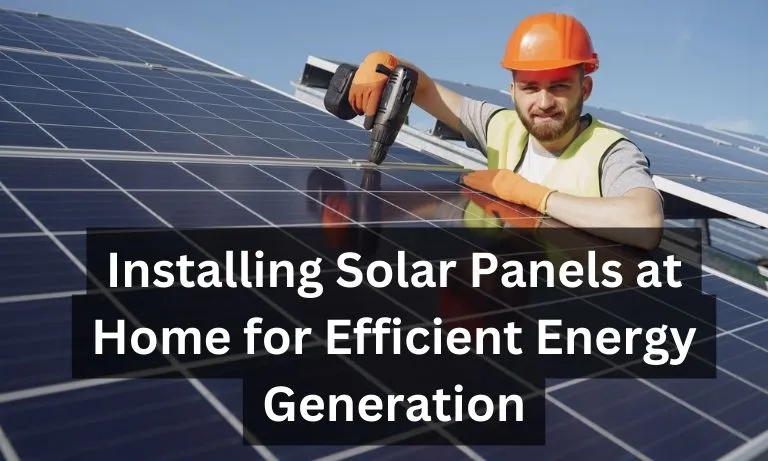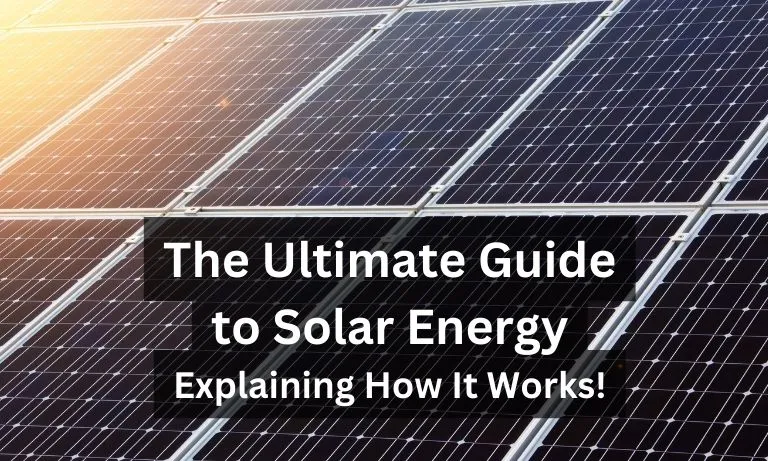How to Choose the Right Solar Panel System

Harnessing the power of the sun is a fantastic way to reduce your carbon footprint and save money on electricity bills. But with an array of solar panel options available, selecting the right system for your home can seem daunting. This guide explores nine crucial factors to consider when choosing the perfect solar panel system for your needs.
Key Takeaways
- Know your energy needs: Analyze your electricity consumption and available roof space to determine the ideal system size.
- Explore panel options: Consider factors like efficiency, durability, aesthetics, and warranty length when choosing solar panels.
- Find the right size: Strike a balance between meeting your energy needs and maximizing efficiency within your roof limitations.
- Prioritize warranties and certifications: Seek long warranties and certifications from reputable organizations for peace of mind.
- Unleash local incentives: Research government programs and rebates that can significantly reduce the upfront cost of solar panels.
- Compare quotes and expertise: Don’t settle for the first offer. Get quotes from multiple installers and assess their experience and customer service.
- Harness the power of reviews: Read customer reviews to gain insights into the reputation, customer service, and workmanship of potential installers.
- Seek professional guidance: Consult with a solar professional for personalized recommendations and navigate the entire process smoothly.
- Plan for the future: Choose a system size with some headroom for expansion to accommodate potential increases in your energy needs.
By following these key takeaways, you can make an informed decision and choose the perfect solar panel system to power your sustainable future.
1. Determining Your Energy Needs: The Foundation for Success
Before diving into specific panel types, it’s essential to understand your energy consumption. Analyze your past electricity bills to determine your average monthly and annual energy usage. Consider any anticipated changes in your household, such as the addition of electric vehicles or new appliances. This will help you estimate the amount of electricity your solar panel system needs to generate. Additionally, assess your available roof space. Measure the usable area for panel installation, factoring in potential shading elements like chimneys or trees. By understanding your energy needs and roof limitations, you can establish a realistic baseline for system size and capacity. Consulting with a solar professional at this stage is highly recommended. They can help you translate your energy consumption into the appropriate system size in kilowatts (kW) or kilowatt-hours (kWh).
2. Navigating Solar Panel Options: Efficiency, Durability, and Aesthetics
The solar panel market offers various types, each with its own advantages. Monocrystalline panels, for example, boast the highest efficiency in converting sunlight into electricity. However, they also tend to be the most expensive option. Polycrystalline panels are a more affordable choice with slightly lower efficiency. Thin-film panels are lightweight and flexible, making them suitable for curved surfaces, but they have the lowest efficiency among the three.
In addition to efficiency, consider the durability and lifespan of the panels. Most solar panels come with warranties ranging from 10 to 25 years. Opting for a reputable brand with a longer warranty ensures peace of mind and protects your investment. Finally, don’t neglect the aesthetic appeal of the panels. Since they’ll be prominently displayed on your roof, choose a design that complements your home’s style.
3. Finding the Right System Size: Striking a Balance
The ideal solar panel system size depends on the delicate balance between meeting your energy needs and maximizing efficiency within your available roof space. A system too small might not generate enough electricity to meet your demands, while an oversized system could exceed your roof’s capacity or your budget. Referring back to your energy needs assessment and roof measurements is crucial at this stage.
During the planning phase, consider your financial goals. Do you aim to significantly reduce your electricity bills or completely eliminate them? Your goals will influence the system size you choose. Solar professionals can help you calculate the optimal system size that fulfills your energy requirements and ensures efficient use of your roof space. Remember, a larger system might generate more power, but it will also come with a higher initial investment.
4. Prioritizing Warranties and Certifications: Guaranteeing Quality and Performance
Investing in solar panels is a significant financial decision. To ensure long-lasting performance and protect your investment, prioritize warranties and certifications. Look for solar panels with comprehensive warranties that cover both the panels themselves and the production output. A longer warranty period typically indicates a manufacturer’s confidence in the quality and durability of their product.
Furthermore, seek certifications from reputable organizations like the National Renewable Energy Laboratory (NREL). These certifications guarantee that the panels meet specific quality and performance standards. Don’t hesitate to ask potential installers about the warranties and certifications offered by the solar panels they recommend.
5. Unveiling Local Incentives: Making Solar Power More Affordable
The good news is that going solar might be more affordable than you think. Many governments and local authorities offer incentives to encourage the adoption of renewable energy sources. These incentives can take the form of tax credits, rebates, or net metering programs. Net metering allows you to sell excess electricity generated by your solar panels back to the grid, potentially offsetting your electricity bills further.
Researching local and federal incentives available in your area can significantly reduce the upfront cost of installing solar panels. Factor these incentives into your financial calculations when determining the system size and overall budget for your solar project.
6. Seeking Multiple Quotes: Comparing Prices and Expertise
Don’t settle for the first quote you receive. Get quotations from several qualified solar panel installers in your area. This allows you to compare pricing, system designs, and the quality of service offered by different companies. When comparing quotes, pay close attention to the specific components included in the system, such as the brand and type of solar panels, inverter, and monitoring system.
A reputable installer will take the time to understand your energy needs and roof limitations before recommending a specific system. They should also be able to explain the different components of the system, the installation process, and the warranties offered. Don’t hesitate to ask questions and clarify any doubts you may have.
7. Harnessing the Power of Customer Reviews: Building Trust and Confidence
Choosing a solar panel installer is a significant decision. While quotes and technical specifications offer valuable information, investigating customer experiences paints a more comprehensive picture. Seek out online reviews and testimonials from past customers of the installers you’re considering. These reviews can provide valuable insights into the company’s reputation, customer service approach, and the quality of their workmanship.
Look for reviews that mention aspects like the professionalism of the installers, the efficiency of the installation process, and the responsiveness of the company’s customer service department. Positive reviews highlighting clear communication, timely project completion, and a commitment to quality can instill confidence in your decision. Conversely, negative reviews detailing issues with communication, installation delays, or poor after-sales service can serve as valuable red flags.
8. Professional Expertise: A Guiding Light Throughout Your Solar Journey
Don’t hesitate to consult with a solar energy expert or installer for personalized recommendations. These professionals possess in-depth knowledge of the solar industry and can offer valuable guidance throughout your solar journey. During a consultation, they’ll take the time to understand your specific needs and assess your roof’s suitability for solar panel installation.
Based on your energy consumption, roof space, and budget, a solar professional can recommend the optimal system size and type of panels that best suit your requirements. They can also explain the different financing options available, such as loans or solar leases, and guide you through the permitting process. A reputable installer will be transparent about the costs involved, the expected timeline for installation, and the long-term benefits of going solar.
9. Planning for the Future: Scalability and Growth
While your current energy needs are crucial, it’s wise to consider your potential future requirements. Are you planning on adding electric vehicles to your household in the coming years? Do you anticipate an increase in your overall energy consumption due to new appliances? Factoring in these possibilities when choosing your system size can save you time and money in the long run.
Opting for a system with some headroom for expansion allows you to seamlessly accommodate future increases in your energy needs. This might involve installing additional panels later or choosing a system with a slightly higher capacity than your current needs. Consulting with a solar professional about your future plans ensures they design a system that can grow with your evolving energy requirements, eliminating the need for costly upgrades down the line.
By carefully considering these nine essential factors, you’ll be well-equipped to choose the right solar panel system that meets your energy needs, maximizes efficiency, and fits your budget. Harnessing the power of the sun can be a rewarding experience, and with proper planning and research, you can embark on a sustainable and cost-effective journey towards energy independence.
Conclusion
Choosing the right solar panel system can seem like a daunting task, but with careful consideration of these nine key factors, you can navigate the process with confidence. By understanding your energy needs, exploring panel options, and prioritizing quality, you’ll lay the groundwork for a successful solar installation. Don’t underestimate the value of seeking professional advice and leveraging customer reviews to gain valuable insights. Finally, by planning for the future and considering potential growth in your energy demands, you can ensure your solar panel system continues to meet your needs for years to come. Investing in solar power is an investment in your wallet and the environment. Embrace the sun’s power and embark on a journey towards a sustainable and cost-effective energy future.




